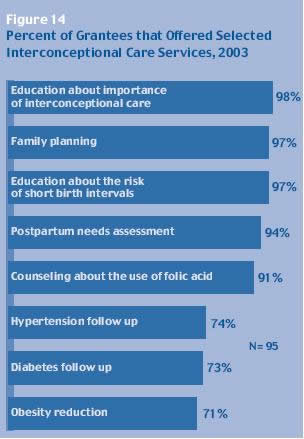| The interconceptional period provides
an opportunity to address women’s
acute and chronic medical issues (such
as hypertension, diabetes, and obesity)
as well as educate them about important
practices that can improve the outcome
of subsequent pregnancies (such as taking
folic acid, quitting smoking, and birth
spacing of 2 years or more). Counseling
services were provided by most grantees
on a wide range of topics, including the
importance of interconceptional care (98
percent); family planning counseling (97
percent); and education about the risk
of short birth intervals (97 percent).
Projects offering these services typically
provided them to three-fourths or more
of their interconceptional clients.
Grantees were less likely to offer services
that addressed medical risk factors, including
hypertension follow-up (74 percent), diabetes
follow-up (73 percent), and obesity reduction
(71 percent). When these services were
offered, grantees reported they were typically
received by fewer than half of all interconceptional
clients. However, because not all women
require these services, it is not possible
to gauge the extent to which the need
for these services is being met by Healthy
Start. |
 [D] [D]
|